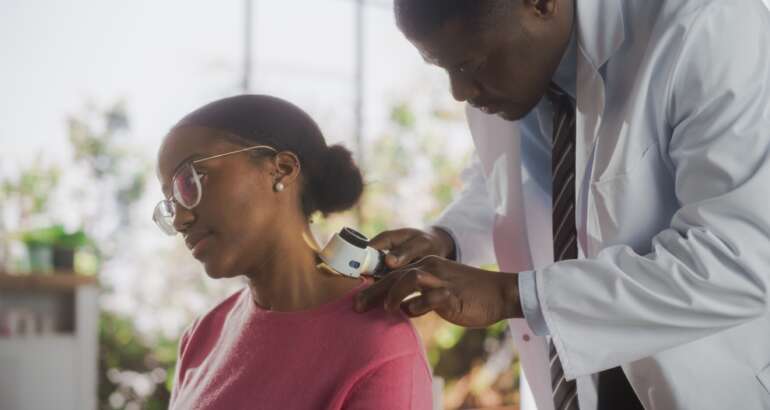Dermatology, the study of skin health, is severely lacking when it comes to brown and black skin, especially skin cancer. Though progress has been made in recent years, most dermatology textbooks don’t include images of skin conditions as they appear on people of color. That’s a glaring omission that can lead to misdiagnosis and unnecessary suffering. This is because many key characteristics of skin disorders, such as red patches and purple blotches, appear differently on people with different complexions. Keep reading to learn why you should find the best black dermatologist near Atlanta.
Cancer In Dark Skin
Skin cancer is not as common in people with darker skin. However, it is more deadly in black and Hispanic patients. Additionally, it is often diagnosed at a later stage. The five-year survival rate is 66 percent for non-Hispanic black patients; a shocking number compared to the 90 percent for non-Hispanic white patients.
Images of skin cancer in dark skin are underrepresented in medical education. Because of this black patients are less likely than white patients to see a dermatologist and less likely to undergo screening for skin cancer. Even when they do see a dermatologist, studies have shown, black patients are less likely to get certain treatments than white people with the same conditions, like oral antibiotics for acne.
Melanoma is the most serious and deadly form of skin cancer. It often develops in black people in spots where doctors may not think to look for it. For example on the palms of hands or soles of feet. Because of this lack of proper education, patients with darker skin are left with conditions that might fester with time and are not treated as effectively as white patients.
What Other Skin Conditions Affect Dark Skin?
Even relatively common skin conditions can stump physicians if they have never seen them in people of color. Many of the more commonplace rashes will vary in appearance in different complexions. Eczema is typically described as making skin red, ashy, and itchy. Additionally, it tends to appear bumpier in black people. Pityriasis rosea is usually described as having a distinctive pattern composed of a large spot with smaller spots branching out from it. However, it may not appear this way in people with dark skin. Doctors often miss rosacea in black patients. This is because clinicians expect to see redness and visible blood vessels on the face.
Nearly half of dermatologists and dermatology residents say they were not adequately trained to treat skin conditions in people of color. For black patients, that often translates into a long and tedious search for the right diagnosis. In some cases, that long search can prove to be detrimental to the patient’s health.
Black Dermatologists
Many black patients prefer to see black dermatologists. This is often due to the fact that they are more familiar with and have a greater understanding of skin issues. For example acne, rashes, and moles. But getting in to see a dermatologist can be difficult, and waits are infamously long. There is a shortage of dermatologists generally, and a shortage of dermatologists of color in particular. Only four percent of practicing dermatologists identify as Hispanic. Also, only three percent identify as black or African-American, according to one study.
Black and Hispanic patients are far more likely than white patients to use the emergency room for dermatology problems. This is especially true in rural areas and smaller cities where there are fewer dermatologists. People of color are half as likely as white patients to see a dermatologist for the same conditions. After all, it isn’t just doctors who suffer from the lack of information, but the people afflicted as well.
At some safety-net hospitals, waits can take as long as a year or sometimes more. Delayed doctors’ appointments, especially for pediatric dermatologists, can have serious consequences. Your needs will always be acknowledged at Acworth Dermatology. Dr. Chappell has years of experience. Also, he has won an award acknowledging him as one of the Top Doctors of Atlanta in 2019. Ready for your skin-care needs to be listened to? Well, Dr. Chappel’s clinic is the one for you. Call today at (678) 505-8030 to schedule your appointment and get the care you deserve!



